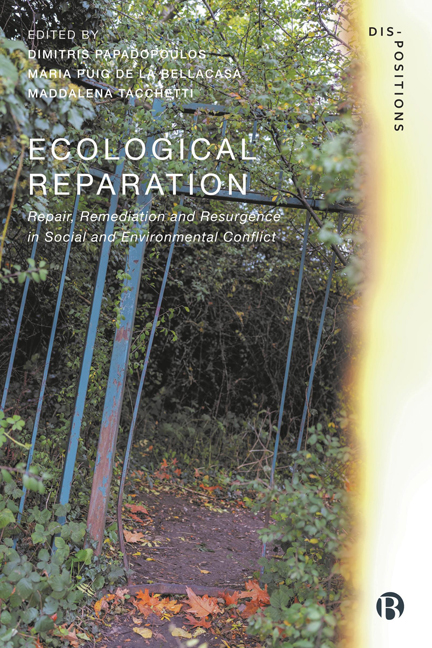Book contents
- Frontmatter
- Contents
- List of Figures
- Notes on Contributors
- Acknowledgements
- Note on the Figures
- Dis-Positions Series Preface
- Introduction: No Justice, No Ecological Peace: The Groundings of Ecological Reparation
- PART I Depletion<>Resurgence
- PART II Deskilling<>Experimenting
- PART III Contaminating<>Cohabiting
- PART IV Enclosing<>Reclaiming Land
- PART V Loss<>Recollecting
- PART VI Representing<>Self-governing
- PART VII Isolating<>Embodying
- PART VIII Growth<>Flourishing
- Index
13 - New Peasantries in Italy: Eco-Commons, Agroecology and Food Communities
Published online by Cambridge University Press: 28 March 2024
- Frontmatter
- Contents
- List of Figures
- Notes on Contributors
- Acknowledgements
- Note on the Figures
- Dis-Positions Series Preface
- Introduction: No Justice, No Ecological Peace: The Groundings of Ecological Reparation
- PART I Depletion<>Resurgence
- PART II Deskilling<>Experimenting
- PART III Contaminating<>Cohabiting
- PART IV Enclosing<>Reclaiming Land
- PART V Loss<>Recollecting
- PART VI Representing<>Self-governing
- PART VII Isolating<>Embodying
- PART VIII Growth<>Flourishing
- Index
Summary
The agroecology of Genuino Clandestino
Starting from the end of the 1960s the so called ‘Green Revolution’ significantly transformed the ways through which agriculture has been developed on a global scale (Shiva, 2008; Altieri and Toledo, 2011; Rosset and Altieri, 2017; Altieri, 2018). The central role of mechanization, the adoption of new technologies, the selection of high yielding varieties of cereals and the extensive use of chemical fertilizers and agrochemicals are the main features of current ‘industrial’ agriculture. These technologies of food production have wide-ranging eco-social implications on biodiversity and climate change, and they entail a relationship of strong dependency between farmers and the world’s largest chemical producers. Agroecology (Altieri, 2018) appears as one of the main alternatives for overcoming the shortcomings and damages that the ‘Green Revolution’ has caused. Agroecology is a response to the question of how to transform and repair our food system and rural life, starting from the ecological practices of peasants and farmers, artisanal fishers, pastoralists, indigenous cultivation methods, urban food producers and so on. In this sense, food sovereignty movements and agroecological farming are creating alternative politics of matter (Papadopoulos, 2018) and by seeking different material circulations and channels of involvement, they enact different possibilities of humansoil-food relations.
Permaculture, organic, bio-dynamic, regenerative agriculture, alternative food distribution: these are some of the names given to practices by which movements of ecological agri-food transition are converging today in emphasizing a need to attend to the health of the soil and the broader ecologies in which we grow food (Altieri, 2018). Food sovereignty campaigns entail the simultaneous responsibility of participants to be food growers and consumers, which means being involved in the processes of food production and distribution by inventing alternatives to the large supply chains that currently dominate the existing agri-food system. However, food sovereignty is something more than the consumers and growers’ right to choose what to consume and what to grow and how. Agroecology and food sovereignty are, first of all, about creating alternative ways to deal with the ecological interactions and interdependencies involved in the processes of farming: the collective enterprise of creating an alternative lifeworld within the interactive dynamics that inhabit the soil and its inhabitants.
- Type
- Chapter
- Information
- Ecological ReparationRepair, Remediation and Resurgence in Social and Environmental Conflict, pp. 194 - 207Publisher: Bristol University PressPrint publication year: 2023



